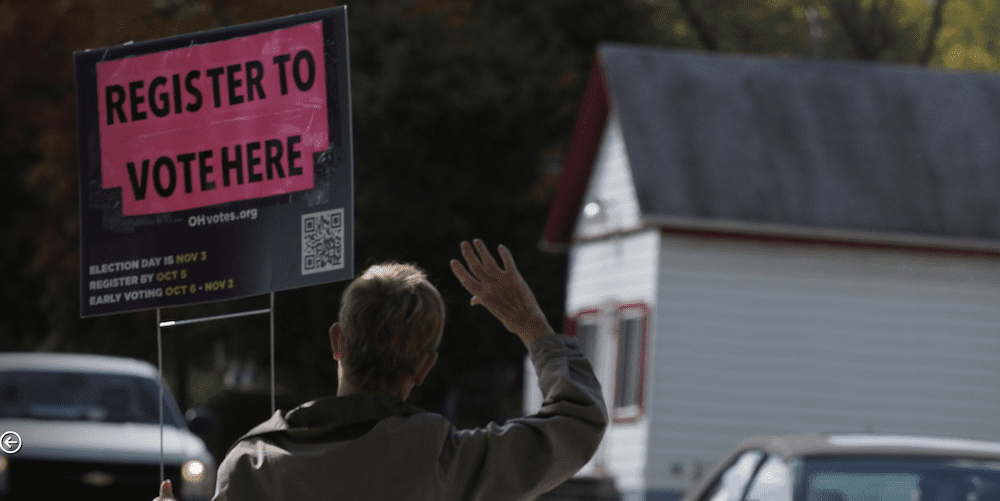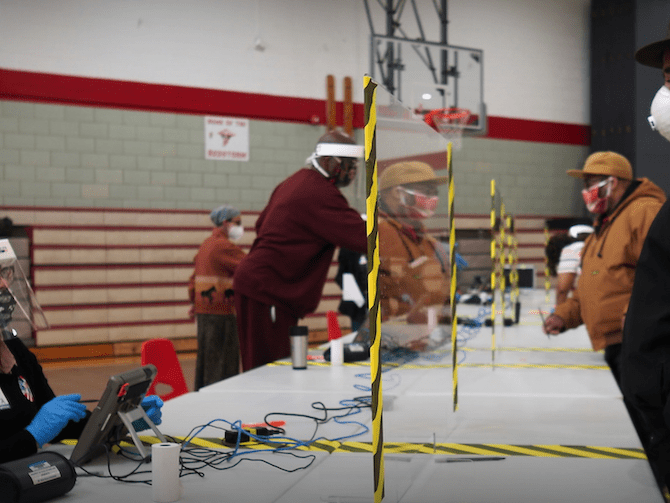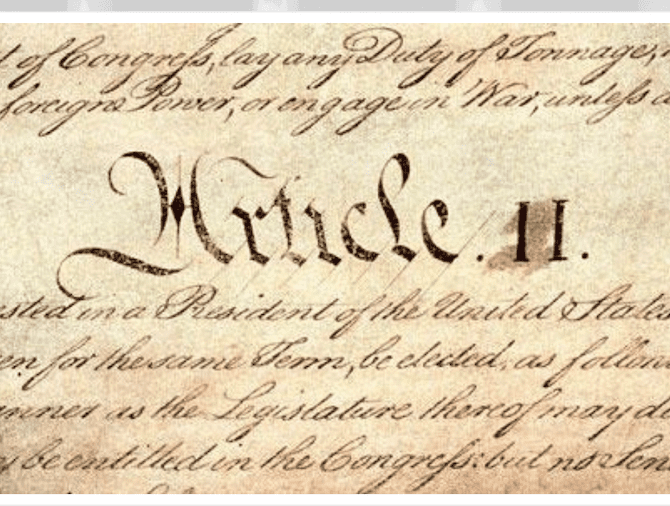Most lawsuits challenging voter rolls, registration have little impact

(Voter registration drive in rural Ohio in 2020. Photo by Sue Dorfman / Zuma Press)
Across the country, the earliest deadlines to register to vote before the Nov. 5 presidential election have passed — including in two swing states, Arizona and Georgia. That hard deadline will have a decisive impact on who can vote this fall.
In contrast, there are dozens of ongoing lawsuits — almost entirely from Republicans and groups allied with former President Donald Trump — that have been filed since late summer and contest how battleground states have maintained their voter rolls and register voters.
But with less than one month before Election Day, most of the registration-centered litigation appears unlikely to impact voters this fall. That’s because most of the suits are ongoing in state and federal court, where most judges are averse to last-minute rulings — especially once voting is underway.
The notable exceptions are Arizona’s new proof of citizenship requirement to register for its state and local elections — which was upheld by the Supreme Court — and, possibly, a Georgia effort to mass-challenge registrations (which counties have begun to reject).
On the other hand, this swarm of lawsuits has given Trump campaigners a prop to sow myths about illegal voters — even if their claims are never evaluated.
This split-screen reality exists because the court of legal option — which has rules of evidence and standards of proof — is not the same as the court of public opinion, where the First Amendment protects political speech, regardless of its veracity.
Nonetheless, in recent weeks most of the voter roll litigation has seen little action. Many officials who have been sued have not responded — delaying the process. Few evidentiary hearings have been scheduled. And some suits have been withdrawn for reasons that do not surprise legal experts — including conservative Republicans who investigated and reported on Trump’s 2020 claims and found “Biden’s victory is easily explained.”
“When you look at what is likely to take place in 2024 if it is a close election, the report ‘Lost, Not Stolen’ is really a handy reference guide,” said Ben Ginsberg, legal counsel for the George W. Bush and Mitt Romney presidential campaigns. “[It] looks at all 64 cases that were filed in 2020, which are similar to the issues that have already been raised in the pre-election litigation for this year. And what we concluded is that the charges that were brought by Donald Trump and his supporters, all 64 cases, lost because of a lack of evidence — not because there were procedural deficiencies in the cases.”
Backing down in Georgia
A Georgia lawsuit by two Trump activists in metro Atlanta is a telling example of a suit that collided with an established federal law — and, after initial bluster, was withdrawn.
The National Voter Registration Act of 1993 instructs states how to maintain voter rolls and expands registration. It also bars removing a registered voter within 90 days of an election. The Trump activists sued one day before that cutoff. Their lawsuit began: “Fulton County does not maintain, nor does it even attempt to maintain, accurate voter rolls.”
That claim is false. Nonetheless, the suit wanted a federal court to order Atlanta officials to disregard the NVRA’s purge deadline if their allies challenged tens of thousands of voter registrations — as was done in 2022’s general election. On Sept. 16, the activists withdrew their suitwithout citing a reason.
Election analysts have reported that there are more than 100 lawsuits across America that target different steps in the process. According to Democracy Docket — a voting rights news platform that tracks election litigation — more than a dozen suits challenging the NVRA have been filed in 2024’s seven battleground states (Arizona, Georgia, Michigan, Nevada, North Carolina, Pennsylvania and Wisconsin).
Almost all challenge technical aspects of the NVRA. For example, they allege:
- More voters on voter rolls than adults over age 18 (Arizona, Michigan, Nevada, Pennsylvania).
- Hundreds of thousands of, or more than a million, errors in voter data (Michigan, North Carolina, Wisconsin).
- State isn’t following the National Voter Registration Act (Michigan, Nevada, Pennsylvania).
- Voters illegally used commercial addresses to register (Nevada).
- State using disallowed, out-of-state data to vet voters (Wisconsin).
- Not disclosing data/information used to vet voters (Pennsylvania).
Most of these claims have not been factually evaluated. And there are yet more voter-list-centered lawsuits. However, a large number of partisan suits does not mean there are massive problems. Indeed, on Oct. 7, the Supreme Court declined to hear a Pennsylvania suit challenging a White House directive to expand registration.
As registration closes in many states, it appears that most of this Republican litigation will not impact voters. Rather, experts say its goal is to “sow doubts” if Trump loses.
“What’s important in 2024 is to beware of the rhetoric,” Ginsberg said. “A campaign and party that loses a close election is going to find reasons to file cases.”






